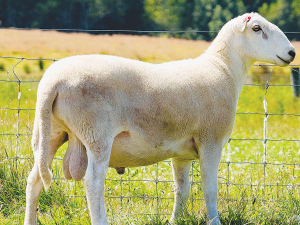For Marlborough Sounds farmer Noel Moleta, farming hair sheep that need no shearing is one of the keys to running a low-input, low-intervention operation in a difficult and highly remote location.
Moleta farms at Waitui, one of the many small bays at the very tip of the Marlborough Sounds.
It is two hours by winding hilly road from Havelock, much of it unsealed and vulnerable to poor weather. Moleta must sometimes resort to sea barge to get stock to Picton.
But by running first Wiltshire wool-shedding sheep, and now Shire hair sheep sourced from Southland breeder Tim Gow, Moleta hasn't regularly shorn his animals in about 15 years.
He has a long working relationship with Gow initially buying the Wiltshire wool-shedding animals for their ease of management. He was more than interested when Gow managed to produce his Shire hair breed, which he trademarked in 2011.
"As soon as he started breeding hair sheep we started buying them."
Moleta has recently confirmed his commitment to the breed by buying two more premium Shire rams, at a top price of $8,800.
"We've bought some expensive rams over the years but what we do is we just buy the best that we think we can get and put it over a line of ewes and then keep the rams for our breeding rams."
While Moleta is based at what is one of the most northern tips of the South Island, Gow is almost as far south as possible, in western Southland near Manapouri.
"We would generally just pick them from the catalogue and buy over the phone," said Moleta.
"It's a rather long drive down there. I just went down there maybe a month ago, but prior to that, we only had two trips in all those years."
Moleta said Wiltshires can be messy as the wool falls off, and they can get sunburned, but that's not a problem with the Shires.
"The reason we've got the hair breed is they are chunkier, gruntier sheep. Just a better sheep."
They also do not need tailing because they shouldn't get dags unless they are undernourished or sick.
Moleta also runs some Angus cattle at Waitui. He also has a block at Tapawera, southeast of Nelson, where he has some sheep but mainly grows hops. A third hill block at Tadmor near Tapawera is running ewe lambs and two-tooths.
He currently has around 5,000 ewes across the three properties.
Waitui was fully organic for many years and ewe numbers have come down from a high of about 5,800 as he has fenced off areas for native bush under the One Billion Trees and Significant Natural Area initiatives.
The economics have been tough. For some years he trucked lambs to ANZCO in Ashburton to take advantage of an organic premium that ANZCO no longer offers.
"Once that change went through we went back to conventional because I didn't want to send our stock any further south; Ashburton was enough. So now we just send to the local plant.
"So we've gone away from organics," says Moleta.
Strong Demand
Southland breeder Tim Gow says a recent auction on his Mangapiri Downs Organic Stud Farm was a success, with prices for his Shire breed of hair rams ranging from $700 to $7,000.
The top-priced ram was bought by Wayne Donaldson of Ashburton.
"This strong bidding reflects the increasing demand from farmers looking to transition from wool sheep to low-maintenance, organic Shire hair sheep," said Gow.
"Mangapiri Downs is now taking bookings for Shire rams and mated ewes, offering farmers another opportunity to secure proven genetics."
The event was Gow's second ram auction for the Shire hair breed, which he trademarked in 2011. He had worked since the 1990s to establish the stable genetics for the breed, largely under the guidance of his uncle, the late Australian animal geneticist Dr Scott Dolling.



















